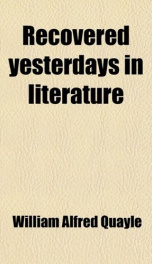Recovered Yesterdays in Literature
Purchase of this book includes free trial access to www.million-books.com where you can read more than a million books for free. This is an OCR edition with typos. Excerpt from book: VI A POET CHRYSOSTOM Nor to be secretive, the poet intended is Francis Thompson. A twentieth-century man we might call him, since he dwelt so deep in the nineteenth as to have been in the very swirl of twentieth-century living. He seems a dweller in the age of Elizabeth and brother to those gorgeous singers who lipp
...ed the flute and from it dripped words with wings. An anachronism you might name Francis Thompson if you were stickler for the calendar, although such as keep close ear to the heart of the world's best things know that all days are June days to the witcheries of the world, and men are all the while as that great spirit who said of himself that he was as one born out of due season. All seasons are seasonable to the creative God; and we may well rejoice with wide rejoicing that in all climes the soil grows blossoms of rarest hue and perfume. The accident of time is not serious. The man who overleaps his century and comes into the middle meadow of the wonders of the eternal consequentials is your immortal. We must not wish to tie men down to their contemporaries. What is man that he should ever be hedged in by his century? Is he not by virtue of his immortality a citizen of all the centuries, and shall he be traitor to his eternality? Was Shakespeare son of England or the sixteenth century, or Milton son of the seventeenth century, or Burke son of the eighteenth century? Were they not transcendent men and spurners of barriers of time? And was Keats a nineteenth-century man? To name it is to deride it. He was son of the long ago, when the world was new and dream- swept and wondering, like little children searching the moonlights for the fairies' forms spinning in the gleam. He was fronted, so to say, backward, and had the flattened eyeball, so that the far seemed n...
MoreLessRead book Recovered Yesterdays in Literature for free
Write Review:






User Reviews: